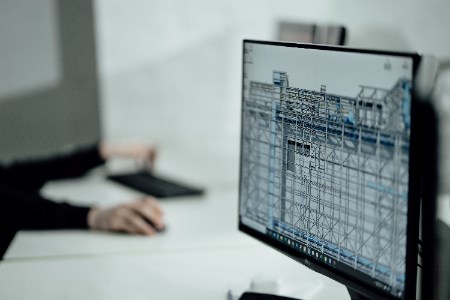Special report: COVID-19 impact on pipeline industry digitalisation
Published by Elizabeth Corner,
Senior Editor
World Pipelines,
Before 2020, many oil and gas companies had already set the course towards industry-wide digital transformation. When the pandemic hit, automation and software tools turned out to be critical for industry survival, making 2020 and 2021 the years of big leaps and impressive results in terms of digital adoption. The challenges presented by COVID-19 forced many pipeline operators to think out of the box and accelerate the pace at which they implement digitalisation changes across their operations.
In this article Angelina Nizamova, Project Director of TOGC Congress, BGS Group, will look at the advancements pipeline companies have made to deal with the changes brought by COVID-19.

Process optimisation and workforce automation
Being asset dependent, pipeline transportation companies are quickly adopting the best Industry 4.0 practices to ensure asset integrity, optimise maintenance, and lower operating costs. These new digital tools and solutions will undoubtedly prove beneficial for the sector in the long-term.
In August 2021, Transportadora Brasileira Gasoduto Bolívia-Brasil (TBG) introduced Brazil's first multi-carrier digital environment: the Capacity Supply Portal (POC). The POC is a virtual space shared between TBG, NTS and TAG, which allows equal access of market agents to new products and services of the natural gas transportation in the country.
All across the world, pipeline industry leaders are working towards process optimisation. Saudi Aramco is developing its Pipeline Integrity Management Sys-tem (PIMS) which is supposed to enhance safety and robustness of its pipeline network, as well as optimise inspection, reduce maintenance costs, and facilitate the decision-making process. In 2021, Petronas announced a similar project - i-PIMS, designed to have minimal people intervention through implementation of AI and machine learning. At the submarine level, McDermott is currently developing a cloud-based platform called SubseaXD that will consolidate and modernise existing processes in marine operations, while focusing on pipeline design, flow assurance, and dynamic configuration analysis.
Remote monitoring and AI data analysis
In the effort to reduce the HSE risks, operational downtime and travel and equipment cost, more and more pipeline transportation companies have been implementing remote operating technologies.
“The time of the pandemic has been a very difficult period for all of us where we have had to fight hard. We have had to combine maintaining the essential service we provide to society with safeguarding the health of our workforce,” said Ignacio Huidobro, Pipeline Control Manager at Exolum.
Many companies now actively utilise AI video systems for workplace health and safety monitoring. The advanced AI uses real-time CCTV footage to quickly recognise work-related accidents or procedure violations, such as failure to comply with safety regulations, wear protective equipment, or, in the case of COVID-19 pandemic, a lack of face mask.
According to Mareike Braun, Program Manager Digitalisation at Linde Engineering, drones can help considerably in on-site inspections while reducing workforce deployment and close staff interaction. Light, easy to transport, and versatile thanks to payload flexibility, drones make a perfect solution when it comes to accessing remote or hazardous areas.
Another prospective avenue for pipeline monitoring is, surprisingly, from space. LiveEO’s Synthetic Aperture Radar satellites and AI-Powered Satellite Analytics oversee the sites and eliminate the direct need for the geophysicist, help-ing to predict and mitigate risks posed by ground deformation and vegetation.
Cybersecurity focus
Ensuring safety from outside threats has always been one of the most crucial parts of digital transformation. In May 2021, it was once again brought to the forefront when US pipeline operator Colonial Pipeline suffered a ransomware attack. With the attacks becoming more frequent, and the industry work processes moving online, efficient cybersecurity is now more important than ever.
Ecopetrol integrated cybersecurity in all aspects of their value chain, establishing a “cybersecurity governance system” for better risk-management in all operational tasks. Saudi Aramco is taking proactive measures on establishing new protocols, oversight structures, and personnel education for cybersecurity. In 2021, Siemens Energy introduced “cybersecurity as a service” and is now providing organisations with access monitoring, detection and cyberattack prevention capabilities.
Virtual networking
The pandemic has drastically changed people’s mindset towards digital networking. Against all expectations, virtual networking events turned out to be even more effective compared to their offline counterparts. With no need to travel and cross borders, companies could connect with colleagues with ease. Events hosted virtually would be able to increase the number of participants and provide a wider reach into a high-level audience. For example, in 2020, the virtual Transportation Oil and Gas Congress hosted over 350 B2B meetings, which is almost twice as much as its offline editions.
Temporary crisis solutions, like financial investment delays, stalled projects, and employee layoffs are insufficient in the long run. To stay competitive in the market, pipeline transportation companies need to exchange experience and implement new, more efficient practices into their operations.
Read the article online at: https://www.worldpipelines.com/special-reports/07122021/special-report-covid-19-impact-on-pipeline-industry-digitalisation/
You might also like
EIC appoints five new non-Executive board members
Energy Industries Council appoints five new non-Executive board members.

